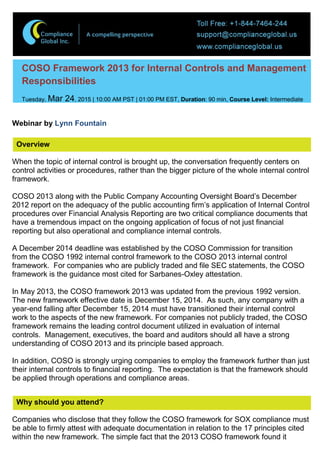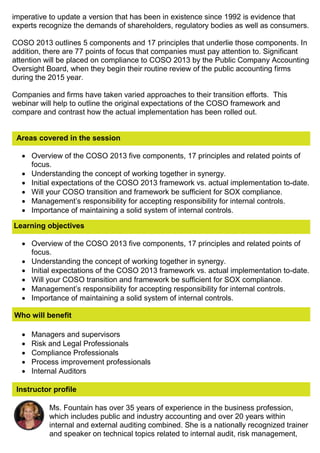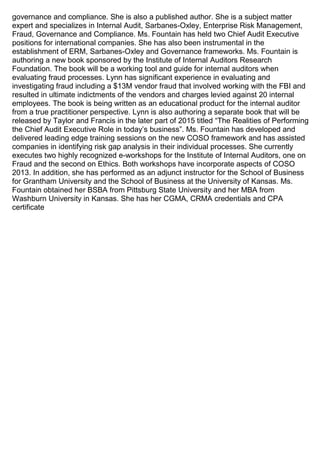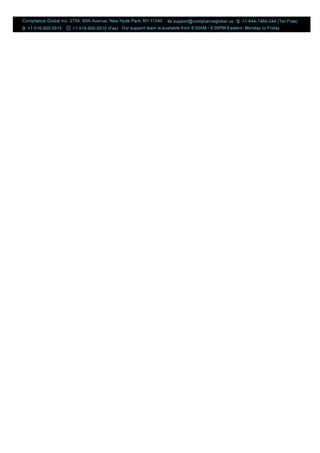Product document template 700022
- 1. COSO Framework 2013 for Internal Controls and Management Responsibilities Tuesday, Mar 24, 2015 | 10:00 AM PST | 01:00 PM EST, Duration: 90 min, Course Level: Intermediate Webinar by Lynn Fountain Overview When the topic of internal control is brought up, the conversation frequently centers on control activities or procedures, rather than the bigger picture of the whole internal control framework. COSO 2013 along with the Public Company Accounting Oversight Board’s December 2012 report on the adequacy of the public accounting firm’s application of Internal Control procedures over Financial Analysis Reporting are two critical compliance documents that have a tremendous impact on the ongoing application of focus of not just financial reporting but also operational and compliance internal controls. A December 2014 deadline was established by the COSO Commission for transition from the COSO 1992 internal control framework to the COSO 2013 internal control framework. For companies who are publicly traded and file SEC statements, the COSO framework is the guidance most cited for Sarbanes-Oxley attestation. In May 2013, the COSO framework 2013 was updated from the previous 1992 version. The new framework effective date is December 15, 2014. As such, any company with a year-end falling after December 15, 2014 must have transitioned their internal control work to the aspects of the new framework. For companies not publicly traded, the COSO framework remains the leading control document utilized in evaluation of internal controls. Management, executives, the board and auditors should all have a strong understanding of COSO 2013 and its principle based approach. In addition, COSO is strongly urging companies to employ the framework further than just their internal controls to financial reporting. The expectation is that the framework should be applied through operations and compliance areas. Why should you attend? Companies who disclose that they follow the COSO framework for SOX compliance must be able to firmly attest with adequate documentation in relation to the 17 principles cited within the new framework. The simple fact that the 2013 COSO framework found it
- 2. imperative to update a version that has been in existence since 1992 is evidence that experts recognize the demands of shareholders, regulatory bodies as well as consumers. COSO 2013 outlines 5 components and 17 principles that underlie those components. In addition, there are 77 points of focus that companies must pay attention to. Significant attention will be placed on compliance to COSO 2013 by the Public Company Accounting Oversight Board, when they begin their routine review of the public accounting firms during the 2015 year. Companies and firms have taken varied approaches to their transition efforts. This webinar will help to outline the original expectations of the COSO framework and compare and contrast how the actual implementation has been rolled out. Areas covered in the session  Overview of the COSO 2013 five components, 17 principles and related points of focus.  Understanding the concept of working together in synergy.  Initial expectations of the COSO 2013 framework vs. actual implementation to-date.  Will your COSO transition and framework be sufficient for SOX compliance.  Management’s responsibility for accepting responsibility for internal controls.  Importance of maintaining a solid system of internal controls. Learning objectives  Overview of the COSO 2013 five components, 17 principles and related points of focus.  Understanding the concept of working together in synergy.  Initial expectations of the COSO 2013 framework vs. actual implementation to-date.  Will your COSO transition and framework be sufficient for SOX compliance.  Management’s responsibility for accepting responsibility for internal controls.  Importance of maintaining a solid system of internal controls. Who will benefit  Managers and supervisors  Risk and Legal Professionals  Compliance Professionals  Process improvement professionals  Internal Auditors Instructor profile Ms. Fountain has over 35 years of experience in the business profession, which includes public and industry accounting and over 20 years within internal and external auditing combined. She is a nationally recognized trainer and speaker on technical topics related to internal audit, risk management,
- 3. governance and compliance. She is also a published author. She is a subject matter expert and specializes in Internal Audit, Sarbanes-Oxley, Enterprise Risk Management, Fraud, Governance and Compliance. Ms. Fountain has held two Chief Audit Executive positions for international companies. She has also been instrumental in the establishment of ERM, Sarbanes-Oxley and Governance frameworks. Ms. Fountain is authoring a new book sponsored by the Institute of Internal Auditors Research Foundation. The book will be a working tool and guide for internal auditors when evaluating fraud processes. Lynn has significant experience in evaluating and investigating fraud including a $13M vendor fraud that involved working with the FBI and resulted in ultimate indictments of the vendors and charges levied against 20 internal employees. The book is being written as an educational product for the internal auditor from a true practitioner perspective. Lynn is also authoring a separate book that will be released by Taylor and Francis in the later part of 2015 titled “The Realities of Performing the Chief Audit Executive Role in today’s business”. Ms. Fountain has developed and delivered leading edge training sessions on the new COSO framework and has assisted companies in identifying risk gap analysis in their individual processes. She currently executes two highly recognized e-workshops for the Institute of Internal Auditors, one on Fraud and the second on Ethics. Both workshops have incorporate aspects of COSO 2013. In addition, she has performed as an adjunct instructor for the School of Business for Grantham University and the School of Business at the University of Kansas. Ms. Fountain obtained her BSBA from Pittsburg State University and her MBA from Washburn University in Kansas. She has her CGMA, CRMA credentials and CPA certificate




